Don't wanna be here? Send us removal request.
Text
Hey Emma,
Great post! I truly enjoyed reading about your beliefs and motivations as an environmental interpreter. I was able to relate to you on many levels as my beliefs as a nature interpreter align with yours! I also think that it is so important to acknowledge your privilege when it comes to nature interpretation. We are all university students doing our post-secondary education which gives us the privilege to gain a certain level of education and opportunities. This, in turn, allowed us to take this course and experience and understand nature interpretation. One thing I learned from this course is that nature interpretation needs to be available to everyone around the world. Regardless of the community that they belong in, programs and facilities must make interpretive experiences more accessible to different groups of audiences.
Another thing that I really liked from your post is that you speak on indigenous culture and their importance. Similar to you, I talked about how valuable it is that we acknowledge and show respect to the people who previously lived on this land and the rich history that it contains. This is highly relevant right now as we need to support the Indigenous community and protect their land. I also agree that gaining a better connection with nature would make this world a better place.
Anyways, I really loved reading your perspective and I wish you the best in your future endeavours as well!
Julia
What are my values as an interpreter?
Over the past few months I have learned a lot about the importance of nature interpretation theory and my responsibilities as an interpreter. I wanted to start by mentioning a formula for nature guiding, written by Enos Mills in 1920. Mills was one of the first individuals to use the term “interpret” when talking about the duties of a “nature guide” and he laid the groundwork for others like Freeman Tilden (1950s) to create the principles of interpretation that continue to guide interpreters to this day (Beck et al., 2018, pp 8, 83). Mills’ formula for good “nature guiding” was as follows:
• Appeal to the imagination and the reason. • Give flesh and blood to cold facts. • Make stories to breathe life into inanimate objects. • Deal with principles rather than isolated information. • Give biographies rather than classifications.
-(Beck et al. 2018, pp. 83)
I love these simple statements because they hold such relevance even to this day. I agree that for interpretation to be real, important, and moving, it should be imaginative, creative, and use stories and real-life examples to make programs interesting and engaging. Many of my motivations for being an interpreter come from my own learning styles and this type of work is very fulfilling for me. I personally am a visual learner and learn the best from hands on demonstrations and illustrations. I also learn much better from hearing someone explain topics instead of reading them in a textbook. As an interpreter, I will strive to make programs interesting and engaging through many different hands-on examples, stories, pictures, and easy to digest information. I will still accommodate other learning styles like making sure I have written options for those who learn better from the written word. I will try to get to know my groups if I can to present information in the most engaging way possible.
The rest of this post contains my core beliefs and motivations as an environmental interpreter, I am interested in hearing what motivates some of you to pursue nature interpretation.
1. Share information in an inclusive way.

(Photo by Emma Lippert)
I have had the privilege to explore many different natural spaces over the years and have been able to further my environmental education in university, but I have come to dislike some things about traditional post-secondary education. Many people I interact with are incredibly smart, but they struggle to share their knowledge with others in an inclusive way, so there is often a “gatekeeping” of information simply because these individuals can’t communicate their knowledge in an easy to digest format. I vow to share my knowledge with others in an inclusive way and not withhold information simply because I think I cannot explain it properly. The whole purpose of interpretation is to share the beauty of the world with others and help them gain a better understanding of how the world around them works.
2. Dispel fear of the outdoors.
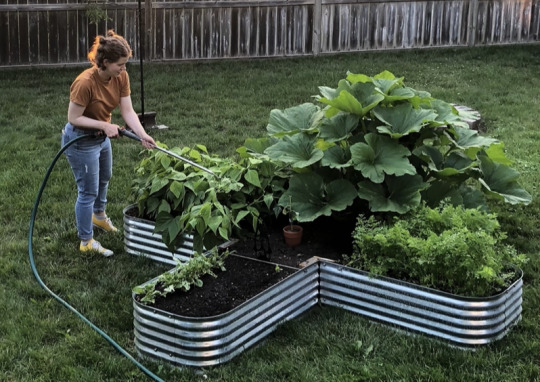
(Photo by Emma Lippert)
I mentioned in my very first blog post that I started out with a tentative relationship with nature as many of the unknowns scared me. Weird insects, spiky plants, vast forests that you could get lost in, they all frightened me and because I hadn’t perfectly “mastered the outdoors” I was constantly discouraged from trying to enjoy it. Having role models like teachers and employers who have encouraged and pushed me to explore more of nature, I have grown to really appreciate all that it has to offer. I noticed that once I learned some facts about certain creatures or plants, I could better appreciate them and their role in life on earth and I know that I will continue to use my knowledge to help others be less afraid of nature and embrace it for all its complex beauty.
3. Fight for access to natural spaces and removal of systemic and structural barriers.
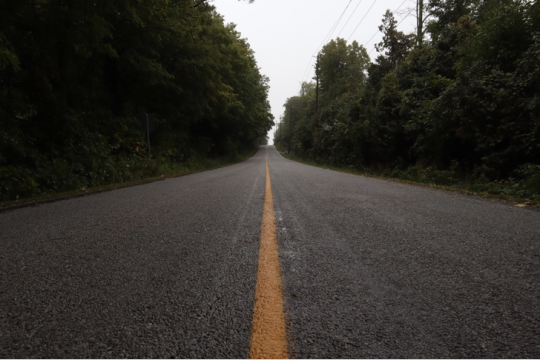
(Photo by Emma Lippert)
I believe that everyone should have access to nature interpretation activities and natural spaces. Much of this fear of nature can come from inadequate environmental education or barriers to accessing natural spaces. I think it is very disappointing to know that there are people who live so close to parks and natural spaces, but can’t access them due to financial, language, transportation, or accessibility barriers. If we can start to bring people to nature or nature to people more often, we could see more people becoming empowered by the environment and respecting it. Through increased affordable transportation options to parks, lower entrance fees, well maintained and accessible trails, multilingual signage, a diverse range of interpreters, and more events that include various marginalized communities, some of these barriers can be minimized (Beck et al., 2018, pp 134-137).
4. Creating community gardens and other environmental initiatives in urban settings
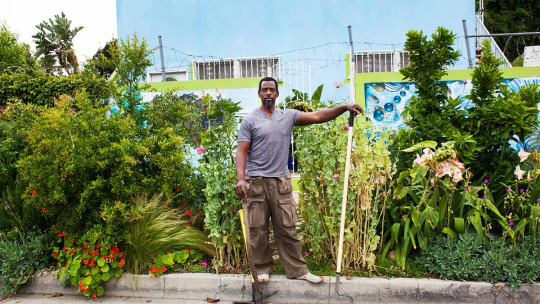
(photo of Ron Finley from https://worldwarzero.com/magazine/2020/06/eco-hero-ron-finley/)
In the future I hope to work with other non-profit organizations to help make natural spaces more accessible and approachable to a wider range of demographics, especially those who cannot afford to visit natural spaces. I believe there is great importance in community engagement and I think local initiatives such as community gardens or refurbishing local parks are really important in bringing nature to urban spaces and providing an educational opportunity.
Here is a link to an article and a short video about a group in Guelph who came together to improve a community garden’s compost system. https://guelph.ca/living/recreation/parks/community-and-pollinator-gardens/
I also highly suggest you watch this TED talk by Ron Finley on his work in South Central Los Angeles and how he is transforming urban food deserts into places where communities can come together, learn, and grow their own food. These are the kinds of initiatives that make me excited to work with the environment. https://www.ted.com/talks/ron_finley_a_guerrilla_gardener_in_south_central_la/transcript?language=en#t-2942
5. Highlight Indigenous cultures and their importance.

(Gwaii Haanas National Park Reserve, National Marine Conservation Area Reserve, and Haida Heritage Site. (Parks Canada) https://www.haidagwaiiobserver.com/news/reopening-of-gwaii-haanas-delayed-until-2021/)
Finally, I believe that for Canada to have any success in the future, we must make amends with Indigenous communities and work collaboratively with them to help interpret and protect our ecosystems and land. I have always admired Indigenous belief systems and how connected they are to the earth. If we could all just understand our connection to life on this planet, I think this world would be a much better place, but urbanization and colonization have separated us from this relationship. In future interpretation roles I will make sure to integrate Indigenous knowledge holders and their stories into talks to remind everyone of this important link between peoples.
Thank you for reading this far! It has been a pleasure getting to learn with you all and I wish you all the best in your future endeavours!
References
Beck, L., Cable, T. T., & Knudson, D. M. (2018). Interpreting cultural and natural heritage. Sagamore-Venture Publishing.
6 notes
·
View notes
Text
Hey Steven,
I really enjoyed reading your post! I was able to relate to you on many levels. I also started this course not knowing what being a nature interpreter meant. Similar to you, I simply thought that they were tour guides that guided visitors through museums while relaying descriptive information that they were provided. Now having taken this course, I have a better understanding of the depth of influence that they have on people. The meaningful experiences they provide to the visitors the connections that they make to natural and historical resources around us. It is truly an admirable job to be a nature interpreter as they change people's view on nature, engaging people to live more sustainably and creating a better world.
I also really liked that you created your own code of ethics as a nature interpreter. It was so unique and interesting to read. The third point in your code of ethics really stood out to me as the Unit where we had to acknowledge our privilege was eye opening to me. I previously had never thought of how privilege can play a role in nature interpretation. Therefore, I think it’s great that you included this factor of privilege into your code of ethics. It’s so important that programs and facilities are accessible to all audiences in order to encourage people of all communities to engage in nature interpretation.
Anyhow, you did a great job at creating a code of ethics and I enjoyed reading your post.
Thank you for a new perspective,
Julia
My Journey as a Nature Interpreter
I began this course ignorant of what being a nature interpreter consisted of. My early assumption was that the role of a nature interpreter was to just explain and guide people to their environment. In a sense yes this is what they do, but there is a whole different level of complexity and skill needed to be considered a proper nature interpreter that I never thought of.

Throughout this course, I have learnt a lot about myself and who I want to be. I have taken something from each unit and created my own code of ethics (Steven’s Code of Ethics as a Nature Interpreter):
1. Be knowledgeable. Understand who you really are as an interpreter, understand your audience, and constantly think of ways to make your audience’s experiences more meaningful. Learning about nature is important and all but remember that meaningful connections last longer than random facts.
2. Be flexible. Realize that everyone is different and learns differently. Utilize different skills to help people learn more efficiently.
3. Treat everyone with equity. It is important to include everyone, but it is also important to realize that people come from different privileges. Making a program to ensure that everyone can have the same experience should be the goal.
4. Be open to new ideas. Constantly explore with different lens as there are many perspectives when viewing a topic. Welcome other ideas and go along with it. See where it takes you.
5. Honesty and Integrity. Be reliable and responsible for your actions. Keep your word and be respectful of the people and nature around you.
These are just some code of ethics that I thought were important. Was there anything that I was missing from your list that you think I should incorporate?
From creating Steven’s Code of Ethics, I realize that these traits are transferable to the profession that I currently am in. I work as a physiotherapist assistant and constantly must work on my knowledge of the field. Although in my field being knowledgeable about the topic is considered more important, there is still a huge emphasis on understanding the patient. I find that being able to connect to the person and fully understanding them, optimizes the entire healing process.
Being flexible is important for building strength and stability, allowing for greater range of motion. Oh, sorry for the wrong context of flexibility (a bad health joke, although it is important to remember to stretch your body), what I meant to say is that every patient is different and will need different programs and techniques to treat.

As I live in Toronto, Ontario, I have met people from different races, varying in age and gender and have treated them all to the best of my ability. Regardless of what it might be, I always ensure to work to the best of my best abilities.
As for the fourth code of ethics, I am constantly learning from other professionals that I work with, such as the chiropractor, the head physiotherapist, the athletic trainers, the message therapists, and even the patients themselves. It is important to remember that as human beings, we are not able to know everything. We must constantly communicate with each other and be open with the different perspectives that the other professions might look at the situation.
And for the last code of ethics, it is important to constantly build trust with the patients as well as your peers. Knowing your limits and asking for help may seem scary, but the main goal is to always improve the condition of the patient. By not being truthful, the patient may not see any results or even worse, their injury might worsen.
Although my field is not related to nature, I have always had a love for nature. This course has further my appreciation for nature and made me realize the importance of being able to interpret nature for others. Especially for those who have been less fortunate and unable to grasp the beauty of nature. Whether that be due to being non-privileged such as the story of the Boys & Girls Club of Mar Vista gardens with the low-income housing projects (Beck et al., 2018, p. 127), or the barriers that come with being a minority (Beck et al., 2018, p. 135-147), I want to be able to open their eyes to the beauty that nature has to offer.
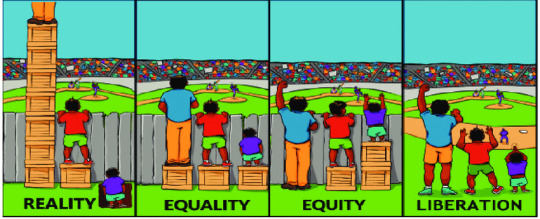
Artist: Angus Maguire
However, I understand that this is easier said than done. Beck et al. (2018) states that due to economic, cultural, communication, lock of knowledge, and fear are possibilities to why minorities are discouraged to participate in interpretative programs. Hopefully by seeing more minorities get closer to nature, other minorities will see that exploring nature isn’t all that scary or hard, breaking down some of the barriers that Beck et al. (2018) has previously mentioned.
I am aware that this is a hard task, as most older generation minorities are stuck in their ways, but we are lucky to be living in a time where technology is thriving. The first step to getting people to explore and interpret nature is first by getting their interest. Before my grandparent’s past, they loved staying home and watching the Price Is Right. They didn’t like going outside as they were scared that they would not be able to communicate with others and be judged by the people around them. But if I had the knowledge and internet content back when I was younger, I could have shown them the beauty of nature through nature walks on YouTube.
youtube
I would have been able to let them listen to the sounds of what hiking through a forest would sound like. I could have got them intrigued with nature and possibly got them to explore it with me.
This course has been amazing and eye opening. I will use everything that I have learnt from this course to help encourage more people who have not been able to experience and appreciate nature the way that I have been able to! I look forward to reading all your blogs and for those who I won’t be able to reply to, have a great winter break!
-Steven
Beck, L., Cable, T. T., & Knudson, D. M. (2018). Interpreting cultural and natural heritage for a better world. Sagamore Publishing
Maguire, A. (2020). The difference between the terms equality, equity, and liberation [illustrated]. Research Gate. https://www.researchgate.net/figure/The-difference-between-the-terms-equality-equity-and-liberation-illustrated-C_fig1_340777978
9 notes
·
View notes
Text
Final Blog Post: Becoming an Amateur Nature Interpreter
Hello friends,
I cannot believe that this is the last blog post for this course. Responding to weekly blog prompts through self-reflections, reading your guys’ personal stories and perspectives on nature interpretation, and engaging in thought provoking discussions with many of you guys have felt like such a treat. It has been a helpful process in building my relationship with nature and learning about the deeper meaning of nature interpretation.
I am ashamed to say that prior to taking this course, I had no knowledge on what nature interpretation meant. I simply thought that tour guides just relay information that they were given and that was the extent of it. I was not aware of the skill sets required for interpretation, the responsibility that lies in being a nature interpreter and the challenges that they face. In other words, I did not have the appreciation that I have now for nature interpreters and environmental educators.
Having gained a better understanding of nature interpretation through this course, I can say that interpreters work hard to provide the public with: meaningful experiences in nature, new perspectives on the world, a deeper connection to their surroundings, a greater understanding of the value of nature and appreciation for the natural and historical resources.
Through this course, I was able to open my mind to new ways of perceiving nature and the world around us. I was able to connect with nature through art, science, history, music, and technology. Not only that, I was able to gain a sense of place and identify with nature.
And now, I can say with confidence that I do consider myself an amateur nature interpreter. Yes, I know that there is still so much more to learn in order to become a successful nature interpreter but I’m beyond excited to further explore the field of environmental education. I have gained a different level of appreciation for the people who work in this field as they use their skill and passion to enrich experiences of many and inspire the public to create a better world.
Furthermore, nature interpreters have numerous responsibilities, but there are two that speak out to me in particular: spreading awareness on climate change and understanding the history of the land. As a new nature interpreter, I’ve started to educate myself on the cultural history of the places that I visit. I have started to work on my land acknowledgement skills and how to properly show respect to the Indigenous Peoples of the land which we step on. This is important to me because there is rich indigenous history that lies in the land that we occupy today. It’s only right that we educate ourselves on the stories of people who previously lived at these places. It’s vital that we address difficult histories of these communities to encourage others to reconcile with the past. “By exposing and elevating the stories of the oppressed and the victimized, difficult histories in museums and historical sites become tools for advocacy, civility, and education” (Beck et al., 2018, pp 342).
One the same note, I believe that the most suitable approach to nature interpretation for me as an individual is through the historical lens. Whether that is on a hiking tour, museum guides, art galleries, I am able to gain a better understanding and see a bigger picture if I understand the historical aspect. Not only that, history interpretation has the ability to promote a deeper understanding of ourselves at the present state and why we are the way we are. I believe that there is so much educational benefit to acknowledging history when interpreting nature.
Spreading awareness on climate change is important to me as a nature interpreter because I feel like they can have such an influence on how people view nature and the environment. They can open the public's eyes to the beauty that nature brings and how we need to preserve this natural gift that we’ve been given. An important lesson that I learned from this course was how to recognize the role of environmental interpretation in sustainability. Specifically, this quote by Jacob Rodenburg, an environmental educator, mentioned in Unit 10 really spoke to me:
“I’m trying hard not to get discouraged. Being an environmental educator in today’s world feels like you are asked to stop a rushing river armed only with a teaspoon.” (Rodenburg, 2019)
This quote made me dive deep into my thoughts for a while. At first it made me quite sad and discouraged. The hopelessness that Rodenburg conveys through comparing his position as an environmental educator to stopping a rushing river armed only with a teaspoon. It made me realize how much more work is required to mitigate climate change and restore nature. The amount of difference that needs to be made, not only by us but also the community and government. All these efforts are required in order to live a sustainable life and reduce the effects of global warming. Anyone that appreciates nature and is concerned about the issues of climate change would understand how discouraging this could be. To do the best that you can to make a difference and live sustainably only to feel hopeless and as though you’re not doing enough. It’s important not to be so harsh on yourself and let obstacles tarnish our hope for a better world. We must push harder to engage others to live more sustainably. As a nature interpreter, we have the opportunity to encourage people to gain meaningful experiences with nature and a greater appreciation for the natural world.
Finally, I want to say good luck to everyone with the rest of the semester. It was so great getting to know you guys and I hope for everyone to become successful nature interpreters.
Best,
Julia
References
Beck, L., Cable, T. T., & Knudson, D. M. (2018). Interpreting cultural and natural heritage. Sagamore-Venture Publishing.
Rodenburg, J. (2019, June 17). Why Environmental Educators Shouldn’t Give Up Hope. Clearing Magazine. https://clearingmagazine.org/archives/14300
0 notes
Text
Hey Lauren!
Awesome blog post and super fascinating topic you chose! I actually had no idea that the ocean is the largest source of oxygen in the world!
And you said that 80 percent of the ocean hasn’t been explored yet?? That is absolutely insane. Sometimes I forget just how large Earth is and how it’s existed for so long before humans have inhibited it. It’s sad to say but I instantly went to wondering how humans will take advantage of those newly discovered parts of the ocean. For example, if they discover an abundant number of fish species or new sea creatures, maybe it will attract the attention of fisheries or tourism companies. What if we ruin those new areas of the sea by polluting it further with oil spills or dumping waste. It really makes me sad to think about things like that but it’s just the sad reality. A part of me believes that it might be better for the environment if we were to never discover the rest of the 80 percent of the ocean. If we just let the living creatures occupy it with no disturbance from human activities, maybe the ocean will thrive more.
Also you saying that there is still so much more of the ocean to explore, made me wonder if there are any more land/ islands that have yet to be discovered? That might be a silly thought but what if we just don’t know they exist!
Great post and thanks for enlightening me on just how amazing the ocean is!
Julia
Nature is Amazing
Hey Everyone!!
I hope everyone’s first podcasts went well last week, it honestly felt a little weird not having a blog post but I am so excited for this weeks!
I personally found this week’s prompt a little difficult because there are just so many amazing things about nature, so it is hard for me to narrow it down. But, I have decided to share my passion for the ocean with all of you! For me, the ocean is one of the most incredible parts of nature. The crazy part is there is still so much that we do not know about it. Did you know that over 80 percent of the ocean has yet to be explored. 80 percent! That is so unbelievable to me. How is it that we have explored so much of the Earth and even space, but have yet to explore the entire ocean? It is so mind boggling to me. Just think about how much we still have to learn from the ocean and the creatures that inhabit it!
In this units chapter, Beck et al. mention how “oceans are the lifeblood of the planet”, which reminded me of the saying that the ocean is like the lungs of the planet. Our oceans are actually our largest source of oxygen, which is a fact that always takes me by surprise. My first thought when I think about oxygen production is always trees and plants. So I think it is really amazing that most of the world’s oxygen is provided by the ocean. For being our largest source of oxygen, you would think that we would take better care of it, but unfortunately that is not the case. We need to do a better job of protecting and conserving our oceans and the incredible species that live within them (Beck et al, 2018). We need to do more as interpreters to help educate and inform people about how important and special ocean ecosystems are so that we can inspire more people to help protect them (Beck et al, 2018 ). I personally would love to work at an aquarium so that I could help instil in others the same passion that I have for the ocean.
For as long as I can remember I have been in love with the ocean. I’ve always loved watching nature documentaries on the ocean and marine species. Marine animals are some of my favourites, I absolutely adore whales, sea turtles, and even sharks. One of my favourite nature documentaries is called Blackfish and it shines light on the horrors of SeaWorld and the consequences of keeping large whales in captivity, specifically Orcas. If you’re interested in marine life and animal care, I highly recommend giving it a watch! It also stands as a reminder that interpreters can make mistakes and we must learn and grow from them. I’m sure SeaWorld started out as a way to connect people with these gorgeous animals, but unfortunately it is not what is best for the animals or the people working with these animals. Now, as I learn more about nature interpretation through this course, I understand that it is a constantly changing and growing discipline. We can learn from the mistakes of places like SeaWorld and strive to be better.
I wanted to end this post with some pictures of the ocean that I took on a trip to Halifax. It is the only time I’ve ever seen the ocean but I desperately want to go back and go whale watching.


All in all, I just think that the ocean is really awesome and I hope that as we continue to learn about this incredible ecosystem, we will start to do better in order to protect it.
Lauren :)
Beck, L., Cable, T. T., & Knudson, D. M. (2018). Interpreting cultural and natural heritage for a better world. Sagamore Publishing
2 notes
·
View notes
Text
The most amazing thing I know about nature
Hey guys, I hope you guys all had a great week! I’m beyond excited for this week's blog prompt because I love learning fun facts, especially about nature! I am curious to see what everyone's most amazing thing about nature is.
For my blog post, I decided to tell you guys a little bit about this super cool way of how acacia trees release gas to protect themselves and warn other trees about danger! Acacia trees are found in tropical regions of the world such as Australia and Africa. They grow all around the African savannah and their leaves are a giraffe's favourite diet.
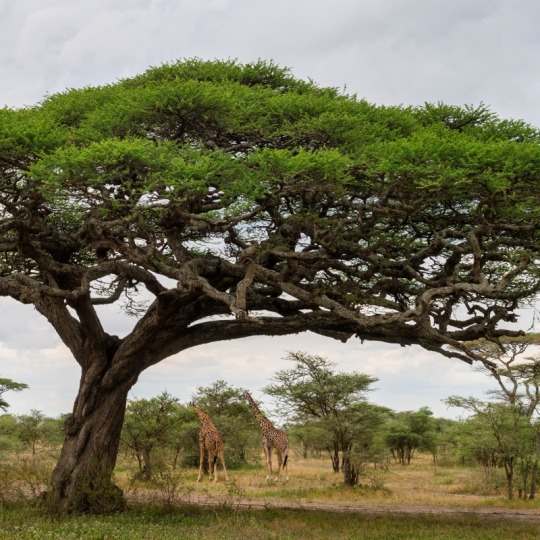
Now what’s cool about these trees is that they are able to defend themselves and also warn neighbouring trees of danger! When these trees sense injury from giraffes eating its leaves, it will start to produce toxins. This toxin is called tannins and in larger amounts it can be harmful to animals. After that, they start to release warning gas in the form of ethylene to warn other trees of the same species in the area of this potential danger.
I find this so fascinating that they have this ability to signal their neighbours about a crisis. Us humans and other animals do this same thing but verbally or through action. But these trees that obviously cannot communicate verbally, have evolved this complex defense system of releasing gas to do the same thing!
Now what happens after the first tree sends signals to its neighbours is that the surrounding trees pick up this warning gas and will now pump toxins (tannins) into their own leaves to prepare themselves for defense. It’s like an army of these trees that are getting ready for an intense battle with these giraffes. How cool is that?!
By doing this the trees can effectively defend themselves from predators such as giraffes who are trying to chew on their leaves. Giraffes that try to eat the leaves with tannins will taste the bitterness and often refuse to continue to feed. However, if these giraffes continue to feed on these leaves with toxins, it could possibly sicken or even kill them.
Now, just when you thought that acacia trees won the battle, these giraffes have unfortunately outsmarted them. Although this is a great way to defend themselves from being eaten, these giraffes evolved along with these acacia trees to work around this. In fact, giraffes will now explore for food while walking into the wind so that the warning gas doesn’t reach the trees ahead of them. In case of no wind, these giraffes will travel 100 yards or more which is way further than ethylene gas can move, in order to feed on acacia leaves.
This is all so interesting to me because you see a tree and they’re just standing still, not doing much. But what you don’t know is that they could in fact communicate to one another via signals! Just like how we communicate by talking, they can send signals in forms of gas or underground through their roots.
What I’m curious to know now is whether trees communicate with each other for reasons other than warning? Do trees release anything when they feel safe and content? Let me know if you guys have any idea! I hope you guys found this interesting.
Julia :)
2 notes
·
View notes
Text
Hey Sydney,
Great post! The picture you attached of Cheltenham Badlands, really captivated me as I have been meaning to visit that landmark for a while now. You mentioned that the badlands used to be a productive farmland 100 years ago. That is absolutely fascinating since I had no clue as presently it does not resemble farmland whatsoever. It’s interesting that what we see in nature right now is just a speck of what there has been. There had to be many historical events and developmental changes that led to the present landscape. It’s important to take into consideration all the relevant stories that come with nature to appreciate what we have now.
I also agree with you that keeping record of the lessons and failures of the past can be beneficial. That way we won’t be repeating history. We can use that valuable past experience to create a better experience in the future.
The question that you posed at the end really had me thinking. To be honest, I think that it’s highly possible that the most breathtaking natural wonder of the world has been destroyed or lost. Knowing this, I think it’s important that we acknowledge and educate ourselves on the history of the land. Just because it has been lost, it doesn’t mean that it never existed. It’s still highly relevant and we must put an emphasis on the history behind it all. It’s also important that we conserve what we have left of nature. Conservation efforts for protecting nature around us must be better enforced in order to avoid making the same mistakes over and over again of destroying natural wonders.
Overall, I really enjoyed your post and look forward to hearing from you again,
Julia
Holding onto history
The following quote is filled with a lot to unpack. “There is no peculiar merit in ancient things, but there is merit in integrity, and integrity entails the keeping together of the parts of any whole, and if these parts are scattered throughout time, then the maintenance of integrity entails a knowledge, a memory, of ancient things. …. To think, feel or act as though the past is done with, is equivalent to believing that a railway station through which our train has just passed, only existed for as long as our train was in it.”(Edward Hyams, Chapter 7, The Gifts of Interpretation) I interpret this quote to say there is nothing more special in an old item than a new item, however there is a unique memory with old items as they carry the knowledge of the past with them. If we do not acknowledge the past then we can’t fully understand the present.
I truly enjoy this quote as I feel as though it shares a very important message. This message being that if we did not experience everything the world has in the past we would be nowhere close to where we are today. It is so important to keep records of the past and learn about the past to keep the lessons and failures in our minds so that we can use what we have learned in the future. This is why we have different historical landmarks, buildings and equipment on display in different areas of the world where they are found. It is important to recognize our history to see how far we have come. If we didn’t understand our history then we would not be shocked and excited when a new development is made. History is needed to allow humans to self reflect and to be grateful for what they have and how far we have come.
Unpacking this quote in relation to nature interpretation, I believe, is a completely new question. This is because I feel as though our natural world history wasn’t fully kept. I am grateful that old buildings and artifacts that show our ancestors’ history were kept for everyone to learn from but I am curious about what was their first. Around the world we have some beautiful landmarks that I truly enjoy visiting and feeling the natural energy they exude but think of all the other landscapes that existed before everything man made was built. Is it possible that the most breathtaking natural wonder of the world was built on or destroyed? Is it possible that that history is lost? Rainforests and meadows are destroyed everyday for human needs. I sometimes wish that natural history was admired as much as man made history.

One of my favourite protected landmarks that is natural but also man-made is the Cheltenham Badlands in Caledon, Ontario. If you have never seen them I highly suggest you take a trip to enjoy the beauty. The reason I am mentioning the badlands in coordination with this quote is that 100 years ago the badlands were a productive farmland, however it was poorly maintained so it was overgrazed and then eroded to create these red rolling hills. I believe this is an example that unpacks the quote because 100 years ago the badlands did not look like this, however the history of how the Cheltenham Badlands came to be is very important for understanding their beauty and significance.
- Sydney
8 notes
·
View notes
Text
Unit 6: Nature Interpretation through History
“There is no peculiar merit in ancient things, but there is merit in integrity, and integrity entails the keeping together of the parts of any whole, and if these parts are scattered throughout time, then the maintenance of integrity entails a knowledge, a memory, of ancient things. …. To think, feel or act as though the past is done with, is equivalent to believing that a railway station through which our train has just passed, only existed for as long as our train was in it.”
(Edward Hyams, Chapter 7, The Gifts of Interpretation)
I had to read this quote a couple times before I was able to understand the message that Edward was trying to convey. I interpret this quote to say that integrity comes with understanding the past, present and the future. If we don’t take into consideration all parts of the scattered puzzle, we wouldn’t be getting the entire story that comes with ancient things. It is our responsibility to appreciate the memory and story that history brings.
The second part of the quote really intrigues me. “To think, feel or act as though the past is done with, is equivalent to believing that a railway station through which our train has just passed, only existed for as long as our train was in it.” First thing that came to mind is the connection I made to indigenous wisdom. From my knowledge, one of key beliefs of indigenous wisdom is that we are simply visitors to nature as indigenous people have been present in nature for a long time. No one takes ownership of the natural world, we are visiting for a part of the time. Chapter 15 of the textbook mentions that the story of the land would not be complete without interpreting the histories of the earlier cultures. It also mentions that the best historical interpreters bring the past alive and are able to make connections to the present and propose possible futures. They don’t simply focus on historical facts, they take into consideration how it relates now to the present and the foreseeable future.
There are valuable benefits that come with understanding indigenous history. By acknowledging indigenous history, we can encourage people to reconcile with the past, vocalize the stories of the victimized people and show respect for the oppressed.
This quote also made me wonder whether I’ve valued the merit in integrity when it comes to nature. Doing this week’s readings helped me understand that when I’m at a historical site, I must not disregard the past events and the stories of people who previously lived on that land. It would help me understand my self-identity, who I am, and how we got here. As it states in this week’s reading, interpreting history nurtures the development of a personal identity as individuals hear inspiring or thought-provoking stories of the past, and it forms values to guide living in the present.
After this week's readings, I decided that next time I find myself at a historical site, I will take time to educate myself on the relevant stories from the past and the indigenous histories that correlate to it. I’m curious as to how doing this will impact me and my present life.
References:
Beck, L., Cable, T.T., & Knudson. D.M. (2018). Interpreting cultural and natural heritage for a better world. Sagamore-Venture.
2 notes
·
View notes
Text
Hey Rachel,
I did not know that there were tree planting jobs like that out there! That is so fascinating and super cool that you took part for two summers. Reading about your tree planting experience living in a tent, surviving off sandwiches and cookies, makes me wonder how I would do in that situation. I actually went tree planting for a day with my school 4 years ago. I really enjoyed the experience because it was rewarding even though it wasn’t as grand of a scale as yours was, it felt great!
I think it’s absolutely fair you say that it was painful and draining. For 3 months straight you were doing physical labour for 10 hours of your day, carrying a 40 pound load?? Yea, you’re a trouper Rachel. It really inspires me to take on more jobs out of my comfort zone that will empower me and teach me to be a better person.
I can also understand how this experience could you push away from nature. Working in the heat, throwing up, being attacked by wasps, I would hate nature too. I guess it’s times like those that can really impact you to be stronger both mentally and physically. You persevered through those hardships and were rewarded with the gift of nature. You got to witness the beautiful wildlife and sceneries that come with nature!
Your story was truly inspiring and I really enjoyed reading your post! I hope you get to go again and have another eventful summer filled with unforgettable memories:)
Julia
lessons learned while planting trees
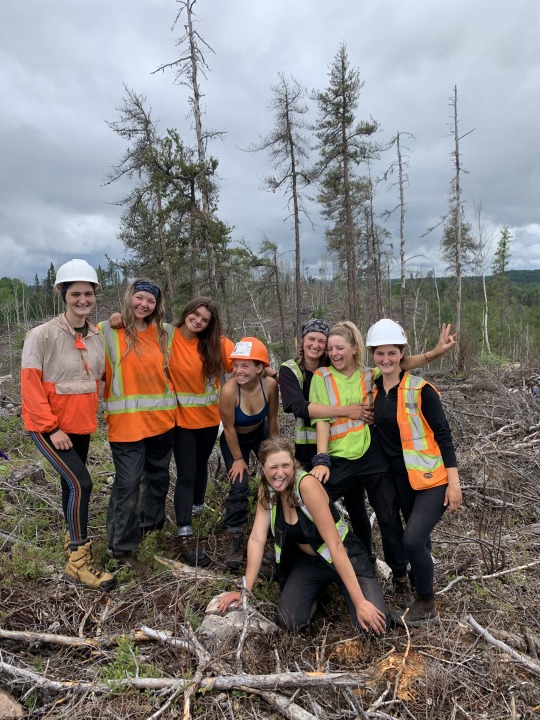
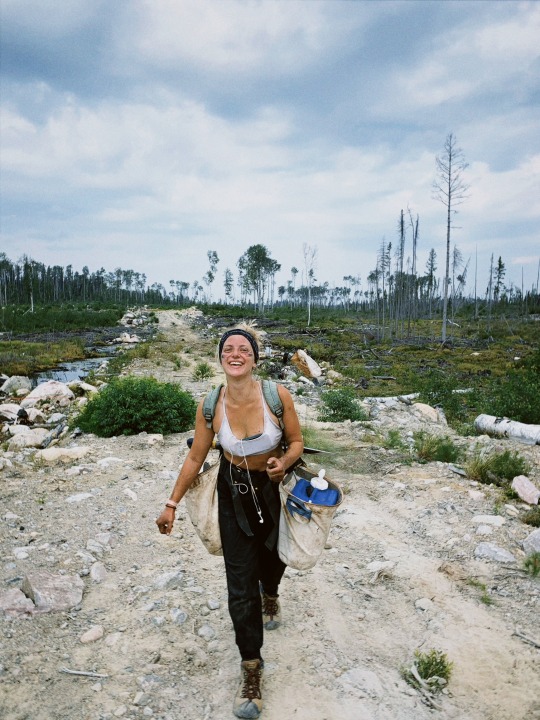
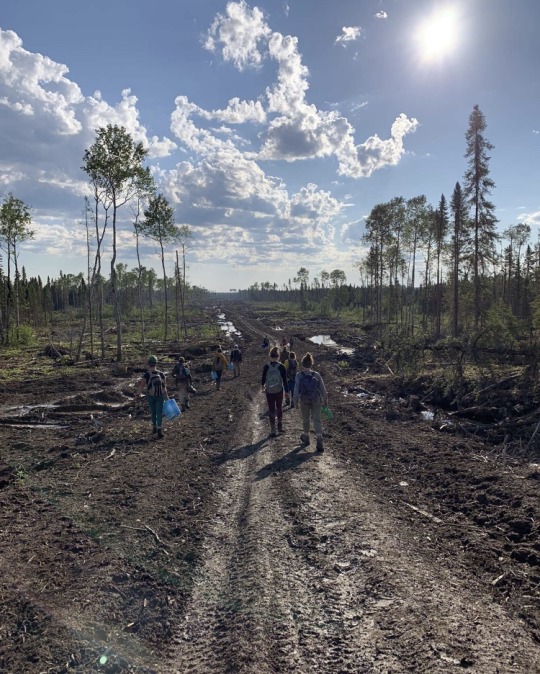
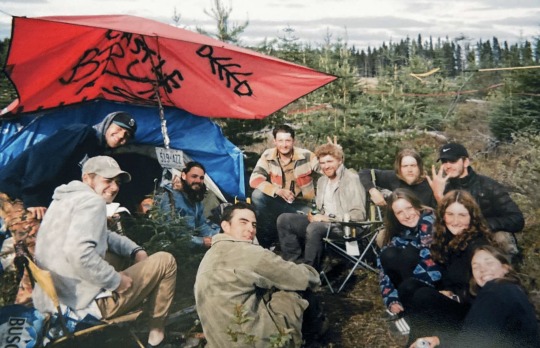
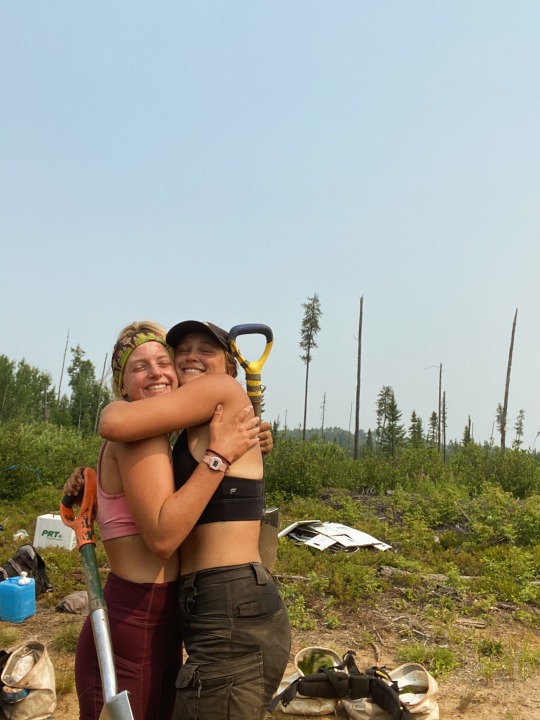
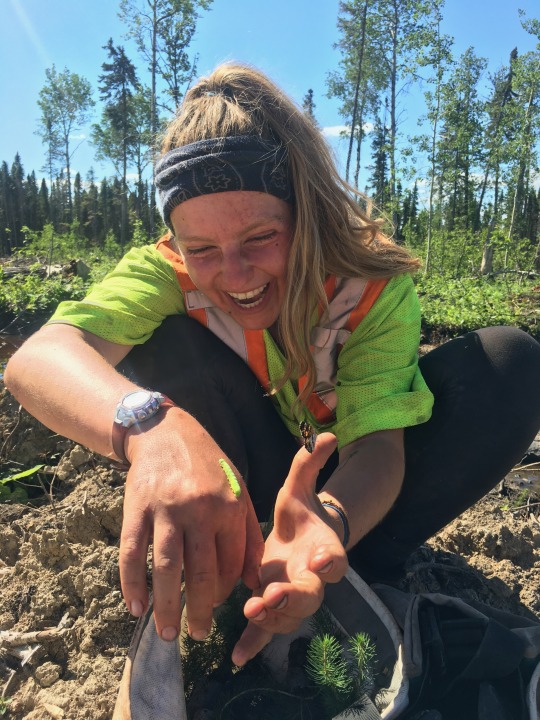
For the past 2 summers I’ve packed my life into a hockey bag, boarded a bus and drove to some remote part of Northern Ontario where I spent 3 months planting trees. Treeplanting is one of the most interesting jobs I’ve ever had in my life. I’ve never done something so painful, draining and defeating but somehow so fun, empowering and beautiful at the same time.
For 3 months I lived in a tent, at various camps a couple kilometers down random logging roads. We travelled all around Northern Ontario, setting up and taking down camp every couple of weeks. There was never cell service, the shower was essentially a hose and a piece of plywood, and my diet consisted of mainly peanut butter sandwiches, oranges and far too many cookies. I got to live and work with some of the most amazing people I’ve ever met who are now some of my closest friends. The planting environment builds close relationships FAST, whether it’s by somebody helping you through a breakdown or just trying to entertain yourselves when there’s literally nothing to do. And after three months of living in the woods together, everybody goes a little crazy.
As a tree planter you get paid based on how many trees you plant (anywhere from 10-14 cents/tree in Ontario), which means you are in control of how much money you make. Each day no matter the weather- be it blisteringly hot, freezing cold, raining or even snowing, you’re planting trees. From 8 am – 6 pm your entire life is “plant a tree, take 2 steps, plant another tree, take 2 steps, step over a fallen branch, plant another tree” all while carrying 40 pounds on your back.
One of the most interesting parts of treeplanting is how it changed my relationship with nature. To me, nature has always been a thing of beauty and abundance, it’s always been a place where I feel calm and at peace. But while planting I realized that nature can also be cruel, harsh and unrelenting. In the same ways nature built me up and filled me with joy in my past, some days it knocked me on my knees and took away all my strength. On days when the heat was so bad I’d throw up, or days when my rain coat soaked through and the wind chilled my bones, and especially when I stepped on a wasp nest and had to run for my life. Some days felt like going to war with the Earth. For the first time in my life I hated nature, and I felt like it hated me too.
Planting pushed me to both my physical and mental limits. I felt a level of tired I didn’t know was possible, I got blisters in places I didn’t know I could, and I learned to live with permanent pain and soreness. If I wasn’t planting as many trees as I hoped, I’d get so down on myself. And spending 10 hours straight with only my thoughts to keep me company was a lot harder than I imagined (thankfully I had my headphones in 99% of the time, as long as Taylor Swift is playing nothing is THAT bad right?).
But for every rain day, there was a day filled with sunshine and blue skies. For every mosquito swarm there was a heron, or a moose, or a baby fox. As much as this job wrecked me, it built me up to become a better human than I was before I was a tree planter. I learned I am so much stronger than I thought, I persevered through even the hardest times, and I was also able to provide support and guidance for my friends.
Although this is the hardest job I've ever had I wouldn't change it for the world! I get to live in the beautiful boreal forest surrounded by cool people for the whole summer! Even at the end of the hardest days you get on the bus, go back to camp and wash the day away by jumping in the lake, eating as much home cooked food as you can and hanging out with your friends. I am so grateful for all of the lessons I learned planting trees, and I cant wait to make even more memories next summer!
4 notes
·
View notes
Text
Working on my relationship with nature (Unit 5)
Taking this course, I have a lot of time to reflect on my personal relationship with nature. From what I’ve read so far in the blog posts, it seems to me that most of the students in this course either feel deeply connected with nature or are a big fan of nature. But what if you’re someone who’s curious about nature but haven’t had much previous experience indulging in nature?
Signing up for this environmental science course, I knew that most of you guys would be big nature lovers. But throughout this course, I’ve come to realize that I have a lot of work to do if I want to feel as comfortable in nature in the way that you guys do. Growing up mostly in cities, I hadn’t had much of a connection with nature. Also I lived in Korea until I was 9 years old so I never had a backyard, my family never went on camping trips, nor did I ever go to summer camps or anything like that. Only after I moved to Canada, I was exposed to more experiences where I was surrounded by nature. It was the first time in my life that I tried ice skating because my friends were going skating on the frozen lake. For the first time, I felt the need to take swimming lessons because my friends invited me to go swimming in their backyard pool. I also tried canoeing for the first time because my school went on a canoeing trip. It was definitely an adjustment, being a kid trying to learn to do these activities which seemed super common to everyone else. I had to hide my fears and act as if I was comfortable. I think this actually pushed me away from nature. I felt like everyone knew exactly how to have fun in nature but I felt so confused.
It also doesn’t help that I have an irrational fear of insects. I think they’re absolutely beautiful and are fascinating features of nature but they are so scary to me. This makes it hard for me to be present and admire the beauty of nature when I’m either laying in the grass, or camping in a forest, or even taking a stroll in a park. I’m constantly bombarded with the thought of walking into a spider web or being stung by a bee. This is really irritating because I want to be able to experience nature without the interruption of a fearful thought.
I think these fears of mine and my childhood experience pushes me further away from nature. That’s mainly the reason why I took this course. In hopes of building a deeper connection with nature.
I think it’s important to emphasize that everyone interprets nature at their own pace. There is no need to feel discouraged because you don’t have as much experience with nature. As long as you have a passion for nature and you're willing to learn more about the natural world.
I’m curious if there are any of you that can relate to me in any way? And if so, how do you overcome this feeling of not knowing enough, or not having enough experience when it comes to nature? I’d love to hear your thoughts!
0 notes
Text
Hey Georgi!
I couldn’t help but say that the photos you took are absolutely astonishing. I completely agree that photography is a great accessible way people can connect and share nature through art. It's as easy as using your phone to capture nature around you at any moment.
Simply by looking at the pictures you posted, I feel a sense of peacefulness and tranquility. The longer I look at it, the more small details I can pick out from them. I’m unsure if those images were taken using an Iphone but it’s impressive the amount of detail it was able to capture.
I’m especially stunned by your second photo of the rocky mountains. I get a sense of overwhelming stillness and I can’t imagine what you’d feel being there in person. It’s beautiful how you can share your nature's interpretive experiences with others using different forms of art.
Like you mentioned, it can provide more than just a visual. The viewers can sense beauty in the image which can evoke particular emotions or feelings.
Thanks so much for sharing your pictures. I found them so beautiful!
Julia
The Gift of Beauty in Natural Interpretation
For me, nature has always been linked to art because I was always taught to see the beauty in the landscape and not take nature for granted. I have always interpreted nature as being ‘the gift of beauty’ because it is so multilayered and complex to the finest detail. Take for example a single snowflake. At first glance it may not seem like much, but after further inspection, you can see the intricate lattice structure and unique crystallization patterns. In my opinion, no human made art can ever quite compare to even the smallest section of nature. In fact, I think most of art (if not all) is at least partially inspired by nature.
My favorite way of interpreting nature through art, is photography. After reading a couple of blog posts, this seems to be the common trend in natural interpretation. I think this is a great way people can connect and share their nature photography while appreciating the art of others. I am sure a lot of you can relate to this, but often times when I am walking around outside, something will catch my eye and I can’t help but snap a quick picture. However, since I only have my phone to take pictures and not a higher quality camera, my pictures tend to fall short of capturing the true beauty of nature.
I love to look back at the photographs I have taken and remember how the scenery looked in person. Moreover, each photo holds more than just a nice visual, but also a lot of secondary things such as emotion and experience. When looking at a photograph, the observer can usually pick up some sort of feeling or emotion that the picture is expressing. This reminds me of what I read in the weekly reading, that interpretation should instill in people the ability and the desire to sense beauty in their surroundings, which provides spiritual uplift (Beck et al., 2018).
When we begin to interpret nature on a deeper level, a connection is formed between us and nature that hopefully inspires people to want to preserve the environment. Having a personal connection with nature is very important and crucial to understanding the world outside of our urban living. After reading this unit, I feel motivated to further strengthen my natural interpretation skills and participate in conservation efforts to protect the natural areas I have grown to love.
I wanted to share some of the pictures I took in nature that I love to revisit because of what they inspire for me. I am curious to hear what you think of these pictures and how you interpret them, since everyone has different perspectives.
Thank you so much for reading, I hope you enjoyed my post!
-Georgi A.
Reference:
Beck, L., Cable, T.T., & Knudson. D.M. (2018). Interpreting cultural and natural heritage for a better world. Sagamore-Venture.
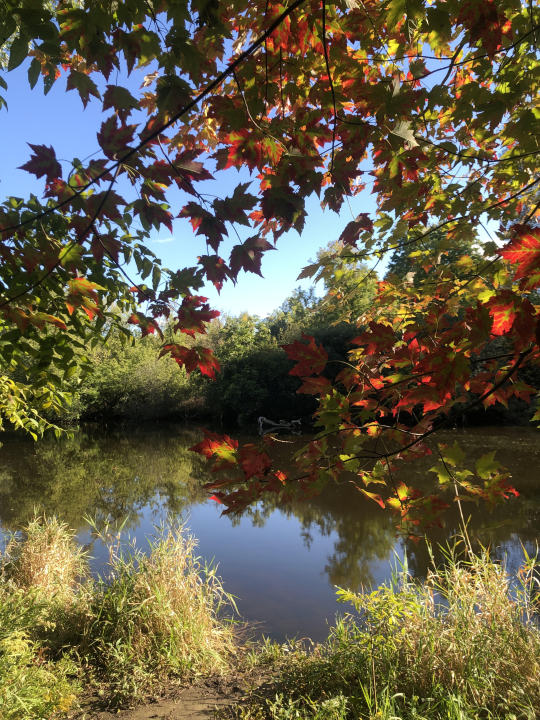
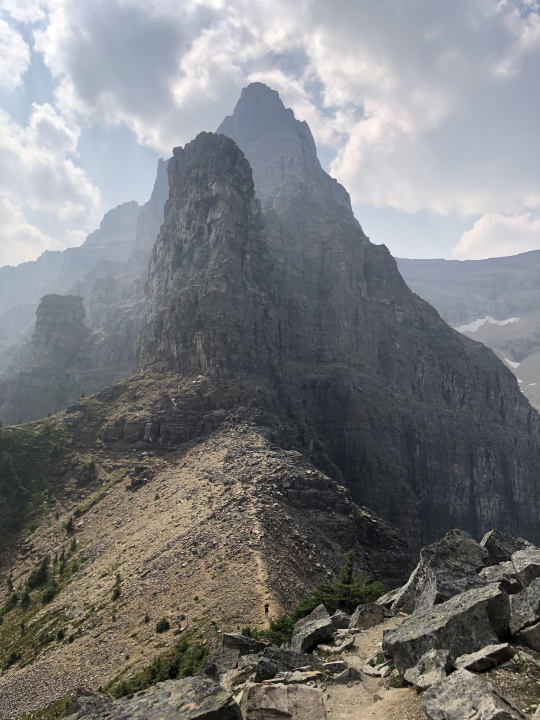
4 notes
·
View notes
Text
Nature Through an Artistic Lens
Nature and the environment around us inspires various forms of art, from visual arts, such as painting and photography, to performing arts, such as music and dance. The truest form of nature interpretation through art for me is painting. Since I was 4 years old, I grew up watching my mom, an artist specialized in water-colour and oil painting, illustrate nature through the arrangement of color and visual display. It fascinated me how she was able to portray the beauty of nature through her paint brushes. Being constantly exposed to nature in the form of arts , I saw the natural connection between the arts and the natural environment. Specifically, one particular artwork of hers left a vivid memory for me. It was a huge oil painting that took up an entire wall in our small house. This art piece consisted mostly of purple, pink, yellow and white color combinations. It was the type of painting that could be perceived in a couple different ways depending on who is looking at it. To me, it seemed like a diverse arrangement of short and tall wildflowers. Through her artwork, I was able to feel, see and understand nature in a different way.
Arts-based environmental education can engage us with natural phenomena in unfamiliar ways and make space for the unforeseen (Boeckel, 2015). Through the artistic lens, we can perceive nature in different ways. The textbook mentions that, “using the arts judiciously helps to convey the messages and to create richer experiences” (Beck et al, 2018). Art holds the capability to enhance the natural interpretive experience emotionally and intellectually. For example, the textbook expands on how art unify and connect groups effectively attracting the “unconverted” people who are not initially passionate about the environment (Beck et al, 2018). This is so important and especially relevant today as art can be used as a method to raise awareness and bring attention to the environmental concerns occurring due to climate change.
I interpret “the gift of beauty” as the ability to find beauty in the environment around me. The feeling, perception, experience and memories that nature provides us with using its natural beauty. I sense beauty in nature when I look at the bright yellow, orange, and red leaves on the autumn trees mid transition. I find beauty in nature walking through a snowy trail watching tiny crystalline snowflakes fall in slow motion from the fair white sky. Anyone can truly embrace the beauty in nature if they stay present in the moment and truly allow themselves to experience the natural aspects around them.
References
Beck, L., Cable, T.T., & Knudson. D.M. (2018). Interpreting cultural and natural heritage for a better world. Sagamore-Venture.
Van Boeckel, J. (2015). At the heart of art and earth: an exploration of practices in arts-based environmental education. Environmental Education Research, 21(5), 801–802.
2 notes
·
View notes
Text
Hey!
I just wanted to say, I don’t think you should feel embarrassed for not having considered the role that privilege plays in nature interpretation until now. I’m on the same boat and so are many other students! We should not be so hard on ourselves for not knowing what we have not been told. We should use this opportunity as a learning curve and focus more on recognizing our privileges now that we are aware. We should aim to improve the interpretive experiences for others so that it's similar to ours. We can try to implement ways to remove cultural and social barriers that limit others from gaining an enriched experience.
Similar to you, I also talked about the privilege of being an English- speaker in my blog post. Like you mentioned, the ability to write in English opens so many more doors for publications and reaches a wider range of audience. This is frustrating because nature interpreters who don’t speak nor write English would not get recognized as much as those who speak english. I also talked about how visitors who do not understand English would not be getting 100% of the experience that the English-speaking visitors are getting. They won’t understand what the guide is saying or where the map is directing them to go. And for that reason, it’s necessary that informative resources like brochures and maps are provided in other languages.
As well, I talked about how less risk is associated with privilege in nature interpretation. To answer your question, another way of how risk is lower for those with privilege is that more supervision and safety measures can be provided with higher costs. For example, an expensive hiking tour might be equipped with more safety gears and tour guides to ensure safety for all visitors. Compared to a less costly hiking tour which can lack safety gears and requiring the visitors to possible share the equipments. I wonder how issues like this could be solved? Do you think there are ways to make safety equipments more accessible to all visitors?
Anyways, thank you for sharing your thoughts. I really enjoyed reading your posts!
-Julia
Role of Privilege in Nature Interpretation

While reading this post, consider that I am using “privilege” here to refer to opportunities and experiences that an individual is given throughout their life that provides them an advantage. These opportunities and experiences are given. By this, I mean they are obtained not through the actions of the individual, but by those out of their direct control.
I am embarrassed to say that before this course I had not considered the role privilege plays in nature interpretation. Privilege provides individuals with opportunities that not everyone may get, and these opportunities can be done at a lower risk. I will dive further into what I mean by this with shortly. In terms of nature interpretation, privilege provides more access to environmental interpretation opportunities.
Speaking and writing in English is one privilege. Large journals are often written in English, so being able to write in English allows for a better chance at becoming recognized in literature. A similar circumstance might be said about communication for environmental interpretation. Since English is a popular language, communicating in English may provide the most opportunities for reaching a large audience. For example, hosting an English podcast would likely reach and appeal to more people than a podcast in a language that is not as popular. Considering this, it makes me wish there were extra measures (if there are not already) to effectively translate material. This would allow those that do not speak English more of an equal opportunity to access information. I am wondering, does anyone have an idea of how to go about this? Or if this is already being done?
Back to the point I touched on earlier (about how privilege comes with more opportunities and less risk). Here I meant that those with more privilege have more opportunities to experience and learn about nature. This could be because of their available finances, having two parents that provide them with opportunities, etc. These things would allow them to be able to do activities that lead to an inspiration for caring about nature and the environment. Although risk can be found anywhere, I state that there is less risk for those with privilege because their life situations may provide them with less opportunities to be exposed to danger. For example, people with more financial security are able to participate in things like overnight hiking trips, go to a cottage, or sign up for a paid podcast without having to worry about the possibility of a financial loss that will negatively influence them. Does anyone else have any other ideas of how risk might be lower for those with privilege?
By understanding the role of privilege in nature interpretation, I have begun to unpack my invisible backpack (think about the characteristics and opportunities I have been given that others might not have as much access to). For example, I am learning about nature and interpretation because of my mom offering me the chance to go to university. This is allowing me to learn about how to effectively interpret nature which may give me a step up compared to others if I decide to make my own interpretation website, social media, or another blog. Recognizing the role of privilege and understanding the privilege we have as individuals is crucial to offer everyone as equal of an opportunity as we can to understand and learn about nature, which I think is a important responsibility of an interpreter.
Image credits: https://thevarsity.ca/2015/01/11/when-is-it-necessary-to-for-us-to-check-our-privilege/
4 notes
·
View notes
Text
The Role of Privilege in Nature Interpretation
What role does “privilege” play in nature interpretation? Please include your working definition of privilege.
Nature interpretation is beautiful because it’s accessible to everyone in some way or another. However, the amount of environmental interpretation opportunities/ exposures and safety measures provided to us throughout the process differs among people. Today, I will share my thoughts on how privilege contributes to the world of nature interpretation.
I define privilege in this specific context as the advantages given to one person or a group which allows them to be exposed to far more beneficial environmental interpretation opportunities without the risks that come with it. For instance, the opportunity to go on canoe trips, cottage getaways, and hiking trips all come with privilege. Along with the ability to get to the destination, financially afford the experience, and understand the languages in which the events are run in are all aspects of privilege that should be taken into consideration when talking about nature interpretation.
More specifically, families without personal transportation might feel limited from interpretive experiences as they lack a way to get to the park or the museum. Similarly, visitors who don’t speak English might not be getting 100% of the experience if they can’t understand the tour guide or the provided informative resources such as brochures and maps. They might even feel left out due to confusion and lack of communication with the guide. In addition, some people might feel hesitant to go to the park or the zoo for interpretive experiences due to the costs of tickets and admission fees.
Privilege also plays a role when it comes to risk management in nature interpretation. For example, a costly school canoe trip with high expenses can afford more supervisors and precautionary resources such as multiple life jackets to assure the safety of the students. Compared to a less costly school trip which can’t afford more than one supervisor nor multiple life jackets for the students. From situations like these, we can acknowledge that with privilege comes fewer risks that you have to take. There is so much more work to be done in order to make environmental interpretation more accessible to all and assure that more people get similar experiences.
This got me thinking, what is in my invisible backpack (as Peggy McIntosh refers to privilege as)? I recognize that I have been provided with many advantageous resources and opportunities that others might not have access to. I am a trilingual East Asian woman living in Canada as a Permanent Resident attending post-secondary studies. Thanks to my family who provided financial aid, I was gratefully given the opportunity to move to Canada, learn English, and attend university. Because I speak English, I was able to take classes in university where I am now learning about nature interpretation. Being an English speaker, I am also able to gain more experience and knowledge as many guided tours and informational sources are in English. This is a privilege that I recognize. It is crucial to step back and think about what privileges you have been given in order to help minimize barriers that limit participation in nature interpretation for others around the world.
Now I want to hear from you guys! What sort of privileges do you recognize for yourself when you unpack your invisible backpack? And how can we make the experience more accessible to others?
Julia
0 notes
Text
Hey Sophia!
Thank you for sharing your perspective on being an environmental interpreter. I really enjoyed reading up on your journey of how far you’ve come with your relationship with nature. I think it’s completely fair that you say you were very naive and unaware of the value of the experience you had in your picture. (Also that is such an adorable picture btws, your fit and the way you’re holding that baby crocodile is absolutely killing me). It’s expected for a young kid at that age to not be fully conscious of the interaction with nature they’ve been given. All that matters is that now you have developed an appreciation for nature and gained personal knowledge on it.
I also love that your ideal role as an environmental interpreter is to educate people on the severity of climate change. It's truly inspirational that you are so eager to emphasize the importance of valuing the Earth we live on. The ongoing climate crisis is a serious issue and it's important that we learn more about it. That way we can learn of different ways to stop/ reduce the human activities that cause climate change.
Thanks again for sharing your story and I look forward to hearing from you again!
Julia
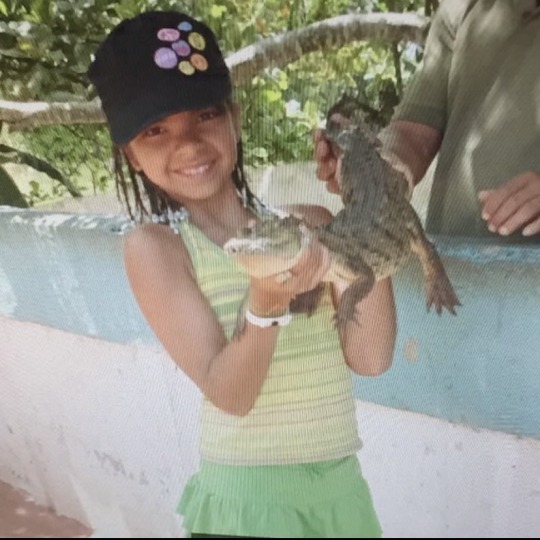
I have been thoroughly enjoying everyone’s blog posts and learning a lot about the meaning behind being an environmental interpreter. Personally, I believe that we are all meant to be interpreters in one way or another. Everybody has the natural ability to be an interpreter, however it is up to you where this ability takes you in life (Beck et. al, 2018)! The critical part is working to improve the teaching skills associated with the role as we mature. Any one person will view the environment in a different light depending on their respective experiences and opinions. Therefore, we all have distinct takes on our surroundings to share and teach to others.
The important component of being an environmental interpreter is making the presentation of your knowledge meaningful in a way that your audience is engaged and excited to learn from you (Beck et. al, 2018)! The process of captivating your audience changes significantly with each event, therefore my ideal role as an environmental interpreter is not finite. The ideal scenario of nature interpretation involves not only an engaged audience, but a topic that I, myself am genuinely interested in and excited to become involved in.
To exemplify my thought process, let me expand on the picture above! I was probably somewhere between 8-10 years old in this photo, which subsequently means I was an impressionable young learner and interpreter. At this age I was very naïve and didn’t truly consider what the experience meant to me. I was not able to fully interpret the interaction I just had with such a beautiful creature of nature and how this was not an everyday occurrence. The hands-on tactile aspect of it all was the most efficient way for me to absorb as a learner. At this age, it was easier to simply embrace hands-on experiences with nature and therefore I would have prioritized an outdoor and tactile role as an environmental interpreter. However, now at 20 years old, a lot has changed within my experience and personal knowledge of nature. As I grew older, my relationship with nature developed into one with a bit of caution and hesitation.
Presently in my life, I think my ideal role as an environmental interpreter would be in a classroom setting, emphasizing the seriousness of climate change in our environment and all around the globe. My 8-year-old self would never think to be an environmental interpreter for climate change, however through life experience and lots of research in school, I am intrigued on the topic to be eager enough to interpret for the right reasons and engage my audience! Evidently, the topic can never be fully learned as it is an ever-evolving area of environmental interpretation that is constantly up for debate. Nevertheless, I would love to engage a younger audience on how critical is to keep our earth healthy and make sure they are excited to do so. I would do this by using a lot of visual aids to physically represent my ideas (Beck et. al, 2018). Using visuals to talk about climate change would demonstrate how real it really is, since it is difficult to imagine when our world seems healthy at first glance. A successful interpretation would improve the chances of the new generation getting involved and continuing the effort of connecting people to the earth (Beck et. al, 2018).
References
Beck, L., Cable, T.T., & Knudson. D.M. (2018). Interpreting cultural and natural heritage for a better world. Sagamore-Venture.
1 note
·
View note
Text
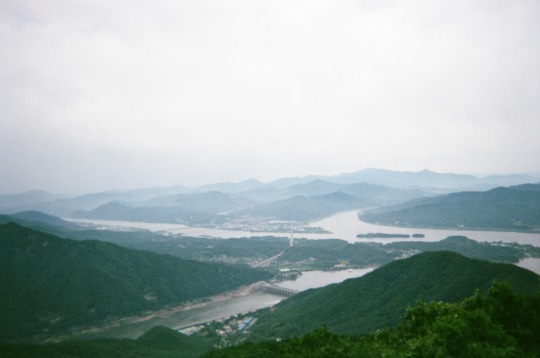
Me as an Environmental Interpreter
Describe your ideal role as an environmental interpreter. What might it entail?
Unfortunately, I’ve had no previous experience working as a nature interpreter or working in nature at all for that fact. However, I’ve always wanted to work in an outdoor setting closely with nature. It’s definitely a career path that I consider and appeals to me because I would love to learn to take deeper meaning in things around me while growing my appreciation for the natural world. My ideal role as an environmental interpreter would be to work in a more physically demanding position such as guided hiking tours. Growing up I have always loved being active so I think I could really thrive being a guide through an extensive hike. This way I’d be able to share my love and passion for nature and its profound ecosystem while getting exercise and staying fit doing it.
Through guiding group hiking tours, I’d wish to encourage my visitors to interact with one another and boost motivation. That way, we can be inspired as a group and build an even deeper connection with the nature surrounding us. Overall, working together as a team would enrich the experience for everyone. Also, I would prefer to work with a smaller group of people so that I could focus on each one of them and provide full assistance to whoever needs it. If I had to guide a large group on my own, I could see myself being overwhelmed, possibly losing the attention of the visitors.
Where might it be?
It would be a dream to be able to work as an environmental interpreter at a park or a hiking trail in the mountains of South Korea. Every year I go back to my home country to visit my family and friends. And when I do visit, I make sure to go hiking with my dad. It’s sort of becoming our tradition now. The picture that I added to this post is actually a picture that I took on one of our hikes. The picture simply did not capture the beauty that lay in front of my eyes. The Korean mountains hold a special place in my heart. Not only does it bring me joy hiking through one but it truly brings me a sense of peace being there. Seoul is a fast-paced and highly-populated city. So to be looking over a huge city like that from a mountain peak that is simply untamed and tranquil is a surreal feeling. You guys have to try it for yourselves. It allows you to gain a greater appreciation for life and the beauty that nature has to offer.
What skills might you need?
The skills necessary for a position of a hiking tour guide would be effective communication, extensive knowledge of the natural world, strategic leadership, high physical endurance level, and finally a general knowledge of health and safety training to avoid any possible injuries during the hike. I think that all of these qualities together would build an exceptional tour guide. Obviously, in order for me to work up to that, I have a long way to go. But the truth is, anyone can take up environmental interpretation, as long as you keep an open mind and are willing to search for deeper meaning in the world around us.
-Julia
5 notes
·
View notes
Text
Hey Katarina!
You made such a good point about how the pandemic shifted our relationship with nature. I grew up in city where I wasn’t exposed too much nature so I have never felt truly connected to the natural world. However, through this pandemic, I grew a way stronger relationship with nature as I leaned on nature for relief, peace and calm. It was the only outlet to resort to when I was stressed and anxious.
My morning walks in the forest has become my absolute favourite part of my day. I take time to listen to the birds chirping, feel the breeze through my fingers and give appreciation to everything that nature has to offer us. Much like you, I learned to love the energy that I get from nature. Now when I’m overwhelmed or stressed, I just simply go on a walk or grab a blanket and walk to the park.
I really think that the pandemic gave us a chance to reset our connection with the wildlife and the outdoors. You’re so right when you say that we took nature for granted until now. Only when we went under lockdown, we started to appreciate the beauty of nature.
Thank you for sharing your story with us! I really enjoyed reading your post.
Julia
Everywhere and Nowhere
There is something uniquely perplexing about nature to me. It is everywhere yet nowhere all at the same time, and only those who take the time to absorb the energy and raw beauty of it can truly be one with it. Some days, I walk from my home to the bus stop merely recognizing the giant maple trees and vibrant flowers that I cross paths with. Other days, the warm glow of the sun hits my skin in the morning as I take a deep breath of fresh air, making me feel grateful to live in this wonderful world of ours. Nature is everywhere and has had the ability to affect everything that it has come across. The stone that we walk along each day to get to the library, the hundred-year-old trees that are perfectly placed outside our campus’ classrooms, the humans of all different backgrounds that fill the university with so much joy and spirit, all stem from the beautiful thing we call nature.
My relationship with nature was rather different than it was eighteen short months ago. When we were not able to go hang out in friends’ houses, or sit inside at a restaurant for dinner, one of the few things that we were in fact encouraged to do was gather outside as much as possible. Being outdoors and in nature empowered us to view it as our homes, and to be quite honest, it opened my eyes to a whole new world. As a child, I was always encouraged to go play outside and spend a sunny Saturday swimming with friends, rather than roaming a mall. It was not until the pandemic hit and what seemed like our only option in life was to be outdoors that I learned to love the energy that is emitted from all things natural. When I was struggling to see the end of Ontario’s first lockdown in 2020, looking for reasons to be happy in nature brought me that feeling. The calming sound of rain trickling on my windowsill, the source of peace I felt when birds gently chirped around me, and the first sight of little tomatoes sprouting, are some of the few but endless ways that made life seem like it was not so bad.
Someone who gives me a sense of place is my paternal grandmother, my “Baka”. She has had the most amazing garden for as long as I can remember, growing everything from tomatoes to pears to basil. My Baka has always taught me to be thankful that the Earth can provide us with fresh, healthy, and delicious food. She always encouraged me to not take this homegrown food for granted, and to not let any of it go to waste. Now that I have moved to Guelph for university, I always return to my hometown ensuring that I pay her a visit. She still makes me feel loved and a sense of belonging when she makes me home cooked meals with food from her garden.
Nature is a beautifully complex thing, and it can be easy to forget that. It was not until a worldwide pandemic hit and I was forced to find the fun in being outdoors that made me realize this fact. I am now eternally grateful for nature and all the powerful energy that it has to offer us. I truly believe that those who seek the beauty in nature will find it and never look back.
- Katarina
3 notes
·
View notes
Text
Hey Emma!
Thank you for sharing your experience with nature. I was surprised to see that you also had to work on your relationship with nature as you weren’t completely comfortable outdoors.
I can relate to what you said about being overly anxious and letting that anxiety keep you away from aspects of nature. I was and still am terrified of insects. I also am terrified of the deep water since I am not a swimmer what so ever. Fears like these keeps me distant to truly opening up to the outdoors and doing things like going on camping trips, swimming at the beach, and canoeing in a lake. It frustrates me because I want to build a stronger connection to nature and I want to experience nature as a whole.
I should take something from your story and start going on camping trips with my family or friends. Maybe it’ll help my relationship with the natural world transition into something more friendly like it did for you. I love that you went from not being so comfortable outdoors to now working in a greenhouse where you get to befriend a golden ladybug. That is so amazing!
I’m truly inspired by your progressing journey with nature. It’s what I seek to find through taking this course. I hope that one day I can go a camping trip without letting the anxious thought of bugs eating me alive. I just want to be able to enjoy nature and be one the all the living creatures.
Thank you for sharing and I cannot wait to hear from you again!
Julia
my relationship with nature
I would say my current relationship with nature is one full of fondness and excitement. I love being outside and taking in the world around me. I have respect for the environment and always make sure to take care when exploring or travelling. I am excited to be learning more and more about how plants function and grow and how to identify many of the plants growing here in Canada. Through my love of photography, I try to capture small moments in nature when something wonderful is happening from a snail moving across the pavement to a butterfly drinking from a flower to raindrops on a spiderweb. Every cloud, every sunset, every rainy day pulls me in further and I try to appreciate the gift nature really is.
I haven’t always felt completely comfortable outdoors, though. Growing up I certainly played outside with my friends, made forts out of sticks and snow, and made “potions” with random berries and leaves, but I think the unpredictable elements of nature discouraged me because I didn’t fully understand it. I was terrified of bees, insects of any kind really, and when I would brush by a plant I would get scared for no reason. I think for a long time, being anxious kept me away from all the aspects of nature that help ease my anxiety now. My family did go on a few long camping road trips across Ontario and all the way to the East Coast, stopping at a different Provincial Park every night, and I absolutely loved them. I loved waking up with the sunrise and feeling the cold morning air, seeing all the different forms that our Canadian landscape can take on, and just being present with those that I loved. Those trips definitely started my transition to a more friendly relationship with nature and gave me that “sense of place”. There was one trip I went on with my science class in grade 9 where we walked around a conservation area with an interpreter and got to take samples from a creek, look at different wildlife, and even identify plants like poison ivy. After a few hours I was an expert at spotting poison ivy and different insects and it made me so excited. Since then I have had a few summer jobs and some classes at the University of Guelph that have really gotten me excited about nature again.
I always cherish the moments with friends, family, coworkers, and even strangers when I learn something new about our natural world or when I can share a breathtaking moment with someone. This summer I was working in a greenhouse cleaning up some annual plants and my coworker walked up to the plants I had just meticulously gone through and pointed out an amazing insect. There was a Golden Tortoise Beetle on one of the leaves and we were both so excited because we had just found what looked like a golden ladybug! I couldn’t believe I had missed it and was so glad that my coworker shared that discovery with me. I find that if I can learn about and understand something, I grow fond of it. Plant or animal, biotic or abiotic, living or non-living, I appreciate it all and I know how much of a gift our natural world is.🌿
6 notes
·
View notes